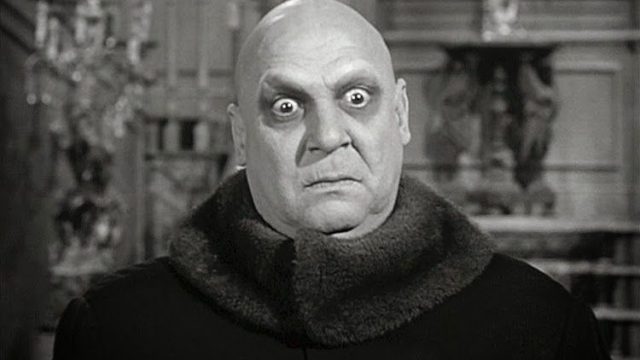Basically, if you’re picturing Jackie Coogan, you’re either picturing him at age seven or in his early ’50s. There is no middle ground. And it doesn’t matter that he acted pretty steadily his entire life, either. TV, movies, and radio, though he doesn’t seem to have done much stage work. He was not an inspired student, when he went to school—he dropped out of college because of low grades—but he made a living in his chosen career his entire life, and that’s something not all of us can say.
But, let’s be real, he should’ve had a much easier young adulthood. And that’s where he is most significant in Hollywood history. When he was twenty, he and several others, including his best friend and his father, were on their way back from a day of dove-hunting in Mexico. Their car was forced off the road. Jackie Coogan was the only survivor. In the years before his death, John Henry Coogan, Jr., had apparently been a conservative supervisor of his son’s fortune—which was massive, not least because of heavy merchandising of his image. However, by the time Jackie turned twenty-one, the fortune was essentially gone.
His mother, Lillian, ended up marrying Arthur Bernstein—one of Jackie’s trustees—just a few years after her husband’s death. That’s fine; there’s nothing inherently wrong with that. But while the timeline seems unclear, at least to me, one thing is not: Lillian and her new husband spent her son’s money. Almost all of it. Jackie was one of Hollywood’s first multimillionaires, and by the time his suit against his mother and stepfather succeeded, there was only about a quarter million of his money left. The implication is strong that they ran through his money in a very short time indeed.
The Bernsteins claimed that young Jackie had thought he was playing games and that they’d never promised to give him any of the money he’d earned. This despite the infamous story that the elder Coogan had told young Jackie that he’s be sent to an actual workhouse if he didn’t give the performance Charlie Chaplin wanted from him in The Kid. There’s no doubt that Jackie was a talented young boy, but the general reaction to the case was such that California became the first state—and remains just about the only state—to safeguard the earnings of child performers, requiring fifteen percent of it to be set in a trust for the child for adulthood. Which is frankly not enough in my opinion, but it’s still better than nothing, which is the requirement in most states.
In a way, it’s a shame that the first place I think of Jackie Coogan is not in truly picturing him at all but in thinking “Coogan law.” I’ve seen him in places other than the Big Two, for one—if nothing else, he did four episodes of Perry Mason—and I do think he was a good actor. But he was so hard up after what his mother did that he actually hit Charlie Chaplin up for money. Without hesitating, Chaplin gave him a thousand dollars. Goodness knows that’s little enough for how great Coogan was in The Kid.
I’m not asking for a thousand bucks, but it would be awfully nice if you’d contribute to my Patreon or Ko-fi!

